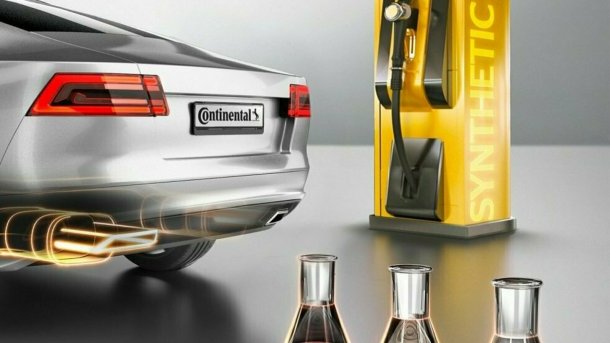ADAC: "eFuels are technically feasible without any problems"
ADAC investigated if synthetic fuel can replace conventional fuel. Technically, there is little to argue against it, but important questions remain unanswered.

(Bild: Conti)
(Hier finden Sie die deutsche Version des Beitrags)
Synthetic fuels have come under increased discussion again this year. They could make vehicles with internal combustion engines less polluting than conventional petroleum-based fuel. The German Automobile Club (ADAC) has investigated the technical arguments against synthetic fuels. The results are promising, according to the ADAC.
eFuels: Technically feasible
Laboratory tests have shown that synthetic fuel works without problems in vehicles that have been approved for it by the manufacturers. Pollutant emissions have not worsened, but neither have they improved significantly. Synthetic fuels still have potential here. With further optimization, it is expected that both the CO₂ balance will improve and pollutant emissions will be further reduced.
The advantage from the club's point of view is that there is no need to wait for the fleet to be renewed, says Karsten Schulze, ADAC technical president. Synthetic fuels are a "good complement to the market ramp-up of electromobility," according to a club statement. Due to a "reduced aromatics content," an "ideally designed eFuel" can be expected to have a "positive effect on air pollution control" through "lower particulate emissions."
Videos by heise
Where to take from?
The ADAC apparently expects eFuels to be available on a large scale soon. Depending on demand, they could be mixed with conventional fuels and thus make an important contribution to environmental protection, it says. Where the club sees the source for a relevant quantity of eFuels on the world market as a substitute for conventional fuels unfortunately remained in the dark.
The question of who will pay for it also remains unanswered. Currently, a liter of eFuel is estimated to cost between four and five euros. This price will presumably be drastically reduced by large production plants and volumes, but time is running out for eFuels, in a sense. If synthetic fuels do become available on a larger scale at some point, which is not currently foreseeable, they will be used first in areas where decarbonization is difficult to implement otherwise. Private transport will certainly not be the first to go, because battery-electric drive is an alternative to the internal combustion engine that has made great progress in recent years and is currently being driven forward globally with a great deal of research funding.
"Excess green power"
After all, the ADAC also acknowledges that the production of eFuels involves a high energy input. According to the club, production therefore makes sense primarily with excess green electricity. However, there is currently no surplus green electricity available anywhere in the world, let alone free of charge. Even electricity generated from renewable sources has a CO₂ footprint due to the construction and disposal of the plants. And it is certainly not free. Both are good arguments for using regeneratively generated electricity sparingly and not frittering it away with atrocious efficiency.
(mfz)